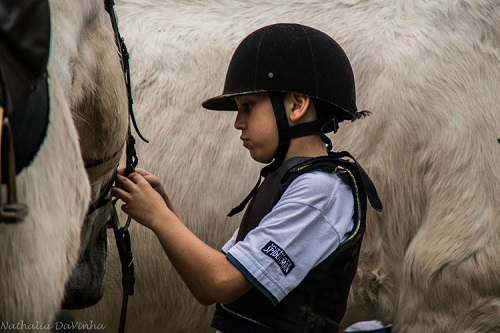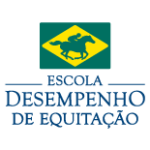- Início
- Escola Desempenho
- Living with a horse
Classes and Clinics
Interacting with horses
“I discovered that the horse is like life itself, a metaphor, but also an example of the mystery of life, its unpredictability, its generosity and beauty, an object of constant and ever-changing contemplation”
Jane Smiley, Pulitzer Prize-winning author and horse lover

The interaction with a horse goes far beyond riding.
Horses are social animals who enjoy company and make lasting friendships. They also use their heightened senses to socialize with other horses and with us humans.
It’s always important to remember that horses have another perception of the world, different from ours, and that we have to try to enter that world. As they evolved on the great steppes and needed to survive attacks from large predators, some of their senses are much more acute than ours and their reactions can be very fast.

The Senses
Hearing – horses have more acute hearing than we do. They constantly pick up noises from all directions in their environment. They can react to noises that they associate with danger. Ears focused forward indicate that they have located something that attracts attention. Ears that are more relaxed or back when you ride indicate that they are focusing on your commands, your leadership.
Smell – horses have a very keen sense of smell. They know their friends by smell. It’s very important that when they meet horses, animals, humans or new objects, they have a chance to smell and memorize them. The sense of smell is also important for assessing the quality of food and water.
Taste – the horse’s sense of taste is essential for assessing whether food is poisonous. Each horse also has taste preferences. They generally like sweet flavors. But some horses don’t like carrots, while others love bananas.
Touch – the horse is extremely sensitive to touch and can feel and scare away a fly just by vibrating its skin. The whiskers and eyebrows are very important for alerting the horse to objects that are too close.
Vision – the horse’s vision is very different from ours. The positioning of their eyes allows them to see 285 degrees around them. Their blind spots are in the tail and the front of the head. Its three-dimensional vision is very poor and so it can react when it gets close to an object. The eye on one side perceives things differently from the other eye. A horse sees much better than we do in the dark, but needs more time to adapt when going from light to shade and back again.
For a long time, people saw horses as mainly instinctive beings. But recent studies are confirming what those of us who live with horses already suspected: horses have a life, emotions and a mind of their own, and they like company.
Intelligence
The horse’s intelligence is linked to social organization, the challenges of finding water and food in a large area and avoiding predators. In the natural life of the herd, there is always a dominant mare who uses her experience to guide and teach the other mares and foals. Below her is a hierarchy where each member must find their place. The stallion’s role is more focused on protection against external dangers.
Navigating the equine world requires an excellent memory and the ability to learn new things – both to function within a social organization and for survival. Horses also have great spatial navigation skills.
Navigating the human world, where many horses live confined and controlled by us, is an additional challenge and shows their adaptability.
Studies show that:
• Horses are excellent at reading body language and non-verbal communication
• Their neighs are complex and can communicate more than we know.
• Horses learn through habit, desensitization, Pavlovian and operant conditioning.
• Horses have an excellent memory
At the Desempenho Riding School, students have the opportunity to learn much more than how to ride a horse. The time spent with the horse is what establishes the Homo-Caballus partnership. All students learn how to clean, bridle and check the basic welfare of the horse. There are also many opportunities to observe and simply be with them, entering a little into this different world.
Through the Homo-Caballus Institute we monitor and research equine behaviour and intelligence and organize courses to pass on this knowledge to our students.

Modalities,
Classes and Clinics
Contact
- Estrada Antônio José, km 5, Faraó, Cachoeiras de Macacu - RJ
- +55 (21) 98156-0212 (Tim) +55 (21) 99765-8576
- escola@desempenho.esp.br
